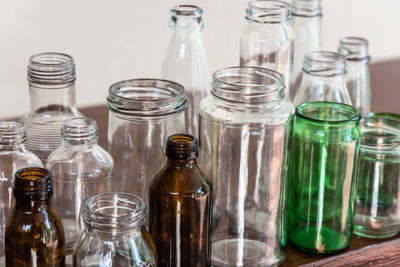The ongoing global battle with plastic: why glass matters
Posted by The Wares Team on 15th Apr 2021
The global battle to finally get rid of damaging, non-recyclable plastic, is accelerating. For decades, traditional and recyclable materials such as glass, wood and paper were phased out in favour of plastic, which was deemed to be durable, hygienic, convenient and affordable.
But as plastic began to be incorporated into every part of our lives, the volume of non-recyclable waste being sent to landfill skyrocketed. Plastic can take decades to break down, and our oceans have particularly taken a hit, with discarded plastic bags and wrap being found in the stomachs of marine birds, fish and other wildlife.
Plastic molecules are now found in every cell of our bodies and even in the deepest waters of the oceans. Plastic molecules are also being found in oyster shells and have even found to be polluting Mount Everest. Plastic waste causes myriad problems. For example, many animals mistake it for food, and it can clog drainage systems and flood low-lying areas. Some studies have also linked plastic to hormonal issues and disease in humans.
Plastic facts to know
Did you know that only 45% of drinking bottles in the UK are actually recycled? Or that we currently dispose of enough plastic every year to circle the earth four times? Furthermore, when we recycle just one ton of plastic, we save around 23 metres cubed of landfill space, over 20,000 megajoules of electricity and over 3,100 litres of oil!
Furthermore, up to 85% of plastic waste is still heading to landfill, because complex manufacturing processes make it very difficult to recycle - not to mention expensive. Even at a very basic level, plastic waste forms a visual blight on the landscape, especially as older carrier bags simply do not degrade and become caught on branches and in hedges for years on end. So what can be done to tackle the problem?
Embracing eco friendly glass bottles jars
One of the best ways to keep plastic out of landfill is to simply reduce its use in the first place. Many manufacturers are already waking up to the need to reduce plastic - driven heavily by changing customer attitudes. Just look at the retailers who are introducing the first recyclable carrier bags for instance, or reducing plastic covering and wrap in stores.
Many people are also making positive choices about the types of materials they choose to use around their homes. After the scandal of BPA plastic additives and the possible links with cancer, people have been increasing their use of traditional containers made of glass, or materials such as wicker, wood, paper and beeswax paper.
Eco friendly glass bottles and jars are a superb choice for storing all manner of items - chutneys, jams, juices and drinks, wine and spirits, and other household items - from buttons to pins! Glass is a fantastic eco friendly material because it can be recycled almost indefinitely and it doesn't pollute the environment with damaging chemicals.
How is glass made?
Those glass bottles that decorate your kitchen shelves are actually made from melted sand! By heating sand to around 1700 degrees C, a molten state occurs which eventually turns the sand to glass. This heat is equivalent to the temperature that a space shuttle will reach as it rockets back into the earth's atmosphere in a fiery ball!
Most glass is made of tiny guartz crystal grains, made up of silica modules. The sand melts as it heats and loses its crystalline appearance, taking on a smooth appearance that is actually halfway between a solid and a liquid. This so-called 'amorphous solid', means that glass isn't actually a true solid, and that it retains a degree of movement over time.
Making use of glass bottles
Everyone knows that plastic is damaging, polluting and unsightly, and we can all do our part to minimise plastic waste in the environment. Why not try using eco friendly glass bottles and jars instead? Here are some ideas to get you started:
1. Store milk in a glass bottle in the fridge - or get a milk delivery which tends to be in glass bottles to your door.
2. Shop at a bulk buy store and decant products such as rice, pasta and coffee beans from paper bags into suitably sized glass containers.
3. Buy a reusable bottle or place a glass decanter onto your work desk for drinks, rather than buying mineral water bottles.
4. Make your own bath products, or buy in bulk and decant them into pretty glass decorative bottles in the bathroom.
5. Buy tiny bottles and jars and use them to make your own handmade presents, wedding favours, party favours and Christmas gifts.
6. Try your hand at painting glass to make your own coloured candle holders or decorative items.
Why not also talk to your children about recycling and get their ideas? You'll be amazed at how passionate kids are about the environment and they often have much to teach us on the subject!

